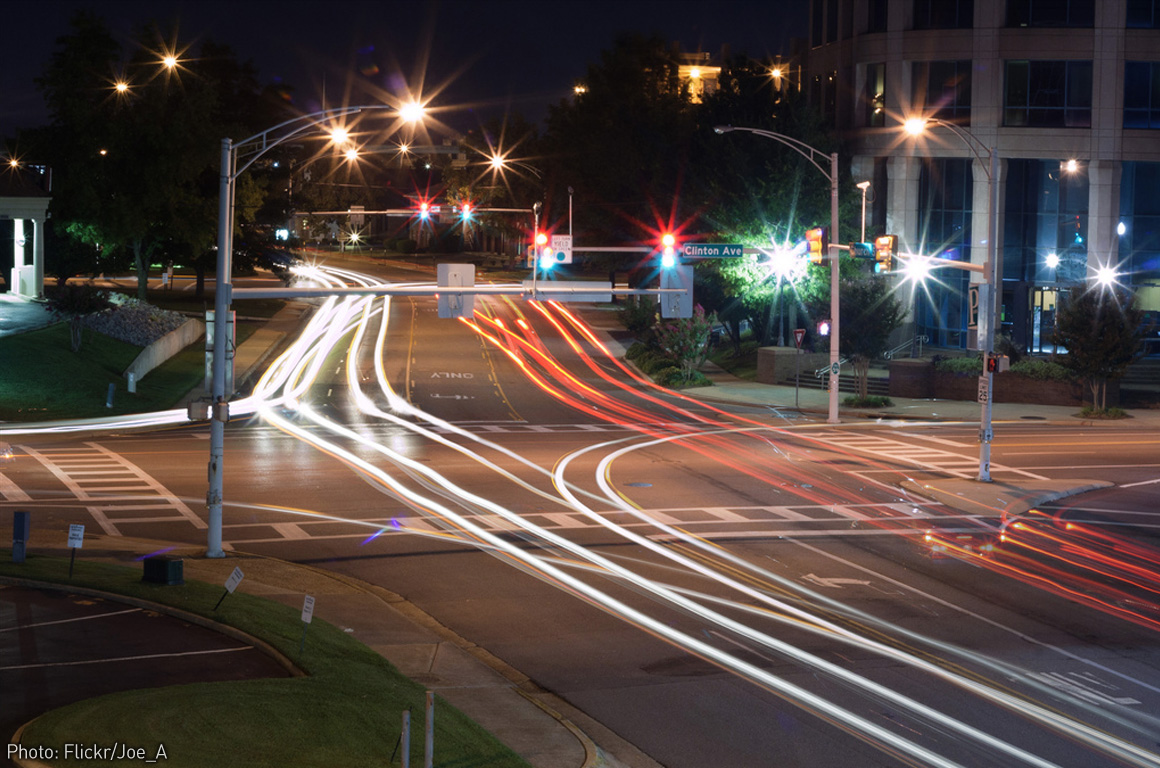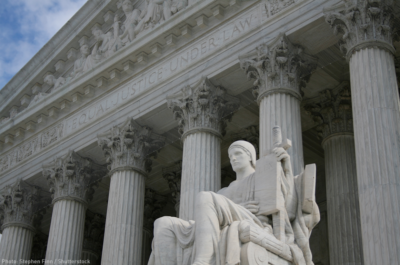
Carpenter v. United States
What's at Stake
The Supreme Court ruled that the government needs a warrant to access a person’s cellphone location history. The court found in a 5 to 4 decision that obtaining such information is a search under the Fourth Amendment and that a warrant from a judge based on probable cause is required.
Summary
In 2011, without getting a probable cause warrant, the government obtained several months’ worth of cell phone location records for suspects in a criminal investigation in Detroit. For one suspect, Timothy Carpenter, the records revealed 12,898 separate points of location data—an average of 101 each day over the course of four months. The Supreme Court heard the case on November 29, 2017.
After Carpenter was convicted at trial, based in part on the cell phone location evidence, he appealed to the Sixth Circuit Court of Appeals. The ACLU, along with the ACLU of Michigan, Brennan Center, Center for Democracy & Technology, Electronic Frontier Foundation, and National Association of Criminal Defense Lawyers, filed an amicus brief arguing that the government violated the Fourth Amendment when it obtained the location records from Carpenter’s wireless carrier without a warrant.
After a divided panel of the Sixth Circuit held that no warrant is required under the Fourth Amendment, the ACLU became co-counsel with Carpenter’s defense attorney to file a petition for review by the Supreme Court. In June 2017, the Supreme Court agreed to hear the case.
Legal Documents
-
06/22/2018
Supreme Court Decision -
10/25/2017
Reply Brief for Petitioner -
10/02/2017
Amicus Briefs In Support of Respondent United States -
- Michael Varco
- National District Attorneys Association
- Professor Orin S. Kerr
- State of Alabama et al.
Carpenter v. United StatesLegal DocumentsMichael VarcoDate Filed: 10/02/2017
Court: Supreme Court (U.S.)
Download DocumentCarpenter v. United StatesLegal DocumentsNational District Attorneys AssociationDate Filed: 10/02/2017
Court: Supreme Court (U.S.)
Download DocumentCarpenter v. United StatesLegal DocumentsProfessor Orin S. KerrDate Filed: 10/02/2017
Court: Supreme Court (U.S.)
Download DocumentCarpenter v. United StatesLegal DocumentsState of Alabama et al.Date Filed: 10/02/2017
Court: Supreme Court (U.S.)
Download Document -
09/25/2017
Brief for the United States -
08/14/2017
Amicus Briefs -
- Center for Competitive Politics, Center for Media Justice, Color of Change, Americans for Prosperity Foundation, and Tea Party Patriots
- Center for Democracy and Technology
- Competitive Enterprise Institute, Cato Institute, Reason Foundation, and Committee for Justice
- Data & Society Research Institute and Fifteen Scholars of Technology and Society
- Empirical Fourth Amendment Scholars
- Electronic Frontier Foundation, Brennan Center for Justice, The Constitution Project, National Association of Criminal Defense Lawyers, and National Association of Federal Defenders
- Electronic Privacy Information Center (EPIC) and Thirty-Six Technical Experts and Legal Scholars
- Institute for Justice, Carole Hinders, Randy and Karen Sowers, and DKT Liberty Project
- The Reporters Committee for Freedom of the Press and 19 Media Organizations
- Restore the Fourth, Inc.
- Rutherford Institute
- Scholars of Criminal Procedure and Privacy
- Scholars of the History and Original Meaning of the Fourth Amendment
- Technology Companies (In Support of Neither Party)
- Technology Experts (represented by the Knight First Amendment Institute at Columbia University)
- United States Justice Foundation, Gun Owners Foundation, Gun Owners of America, Inc., et al.
Carpenter v. United StatesLegal DocumentsCenter for Competitive Politics, Center for Media Justice, Color of Change, Americans for Prosperity Foundation, and Tea Party PatriotsDate Filed: 08/15/2017
Court: Supreme Court (U.S.)
Download DocumentCarpenter v. United StatesLegal DocumentsCenter for Democracy and TechnologyDate Filed: 08/14/2017
Court: Supreme Court (U.S.)
Download DocumentCarpenter v. United StatesLegal DocumentsCompetitive Enterprise Institute, Cato Institute, Reason Foundation, and Committee for JusticeDate Filed: 08/15/2017
Court: Supreme Court (U.S.)
Download DocumentCarpenter v. United StatesLegal DocumentsData & Society Research Institute and Fifteen Scholars of Technology and SocietyDate Filed: 08/11/2017
Court: Supreme Court (U.S.)
Download DocumentCarpenter v. United StatesLegal DocumentsEmpirical Fourth Amendment ScholarsDate Filed: 08/14/2017
Court: Supreme Court (U.S.)
Download DocumentCarpenter v. United StatesLegal DocumentsElectronic Frontier Foundation, Brennan Center for Justice, The Constitution Project, National Association of Criminal Defense Lawyers, and National Association of Federal DefendersDate Filed: 08/14/2017
Court: Supreme Court (U.S.)
Download DocumentCarpenter v. United StatesLegal DocumentsElectronic Privacy Information Center (EPIC) and Thirty-Six Technical Experts and Legal ScholarsDate Filed: 08/14/2017
Court: Supreme Court (U.S.)
Download DocumentCarpenter v. United StatesLegal DocumentsInstitute for Justice, Carole Hinders, Randy and Karen Sowers, and DKT Liberty ProjectDate Filed: 08/14/2017
Court: Supreme Court (U.S.)
Download DocumentCarpenter v. United StatesLegal DocumentsThe Reporters Committee for Freedom of the Press and 19 Media OrganizationsDate Filed: 08/14/2017
Court: Supreme Court (U.S.)
Download DocumentCarpenter v. United StatesLegal DocumentsRestore the Fourth, Inc.Date Filed: 08/14/2017
Court: Supreme Court (U.S.)
Download DocumentCarpenter v. United StatesLegal DocumentsRutherford InstituteDate Filed: 08/15/2017
Court: Supreme Court (U.S.)
Download DocumentCarpenter v. United StatesLegal DocumentsScholars of Criminal Procedure and PrivacyDate Filed: 08/14/2017
Court: Supreme Court (U.S.)
Download DocumentCarpenter v. United StatesLegal DocumentsScholars of the History and Original Meaning of the Fourth AmendmentDate Filed: 08/14/2017
Court: Supreme Court (U.S.)
Download DocumentCarpenter v. United StatesLegal DocumentsTechnology Companies (In Support of Neither Party)Date Filed: 08/14/2017
Court: Supreme Court (U.S.)
Download DocumentCarpenter v. United StatesLegal DocumentsTechnology Experts (represented by the Knight First Amendment Institute at Columbia University)Date Filed: 08/14/2017
Court: Supreme Court (U.S.)
Download DocumentCarpenter v. United StatesLegal DocumentsUnited States Justice Foundation, Gun Owners Foundation, Gun Owners of America, Inc., et al.Date Filed: 08/14/2017
Court: Supreme Court (U.S.)
Download Document -
08/07/2017
Joint Appendix -
08/07/2017
Brief for Petitioner -
02/10/2017
Reply to Brief in Opposition -
01/27/2017
Brief for the United States in Opposition -
10/28/2016
Cato Institute Amicus Brief -
10/25/2016
Electronic Frontier Foundation, et al, Amicus Brief -
09/26/2016
Supreme Court Cert Petition
Date Filed: 06/22/2018
Court: Supreme Court (U.S.)
Download DocumentDate Filed: 10/25/2017
Court: Supreme Court (U.S.)
Download DocumentDate Filed: 09/25/2017
Court: Supreme Court (U.S.)
Download DocumentDate Filed: 08/07/2017
Court: Supreme Court (U.S.)
Download DocumentDate Filed: 08/07/2017
Court: Supreme Court (U.S.)
Download DocumentDate Filed: 02/10/2017
Court: Supreme Court (U.S.)
Download DocumentDate Filed: 01/27/2017
Court: Supreme Court (U.S.)
Download DocumentDate Filed: 10/28/2016
Court: Supreme Court (U.S.)
Download DocumentDate Filed: 10/25/2016
Court: Supreme Court (U.S.)
Download DocumentDate Filed: 09/26/2016
Court: Supreme Court (U.S.)
Download Document-
04/13/2016
Sixth Circuit Opinion -
08/18/2015
Gov't Response to Supplemental Authority Letter -
08/10/2015
Supplemental Authority Letter re Graham -
05/28/2015
Sanders's Reply Brief -
05/26/2015
Carpenter's Reply Brief -
05/06/2015
Gov't Brief -
03/09/2015
Amicus Brief -
03/02/2015
Sander's Brief -
03/02/2015
Carpenter's Brief
Date Filed: 04/13/2016
Court: Appeals Court (6th Cir.)
Download DocumentDate Filed: 08/18/2015
Court: Appeals Court (6th Cir.)
Download DocumentDate Filed: 08/10/2015
Court: Appeals Court (6th Cir.)
Download DocumentDate Filed: 05/28/2015
Court: Appeals Court (6th Cir.)
Download DocumentDate Filed: 05/26/2015
Court: Appeals Court (6th Cir.)
Download DocumentDate Filed: 05/06/2015
Court: Appeals Court (6th Cir.)
Download DocumentDate Filed: 03/09/2015
Court: Appeals Court (6th Cir.)
Download DocumentDate Filed: 03/02/2015
Court: Appeals Court (6th Cir.)
Download DocumentDate Filed: 03/02/2015
Court: Appeals Court (6th Cir.)
Download Document-
03/02/2015
United States v. Carpenter - Sanders's Brief
Date Filed: 03/02/2015
Download Document-
03/02/2015
United States v. Carpenter - Carpenter's Brief
Date Filed: 03/02/2015
Download Document-
03/09/2015
United States v. Carpenter - Amicus Brief
Date Filed: 03/09/2015
Download DocumentPress Releases
Supreme Court Rules Police Need a Warrant to Track Cellphones
ACLU at Supreme Court Wednesday to Argue in Cellphone Tracking Case
Tech Firms Urge Supreme Court to Adapt Privacy Protections for ‘Realities of the Digital Era’ in Cell Phone Tracking Case
Supreme Court to Hear First Cell Phone Location Data Case




